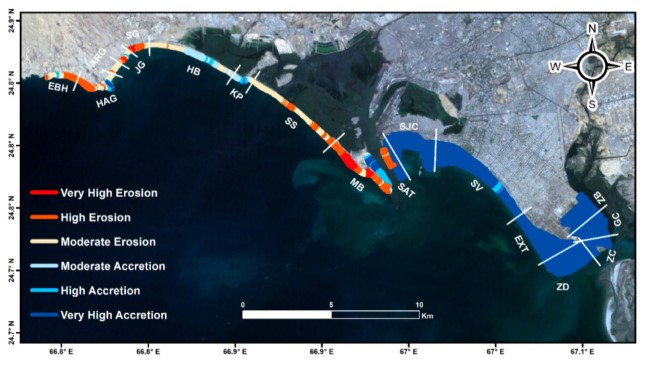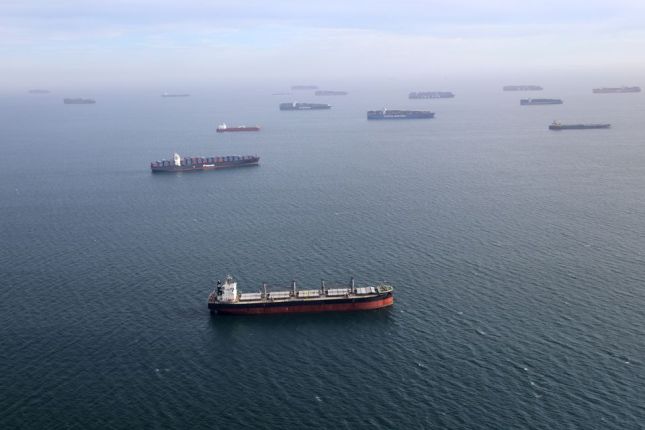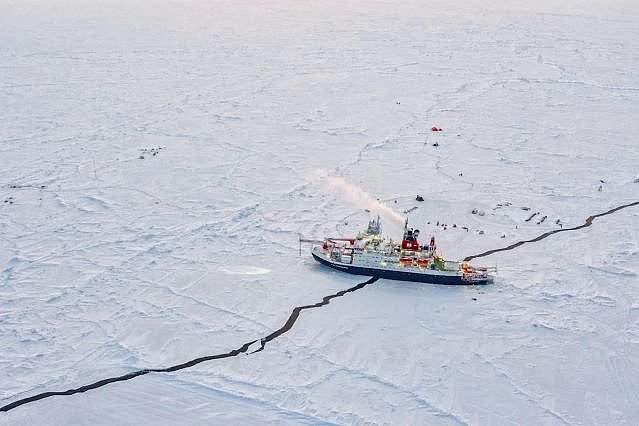In the States, the proximity of real estate to the advancing sea is already seriously damaging the market. Meanwhile, according to a new scientific paper, China is setting record after record in reclaiming land from the sea. Other non-Western countries follow it. The total area of land they seized from the sea in the 21st century only has already reached the extent of Luxembourg. Why this way of "acquiring real estate" is almost inaccessible to Western countries? And how exactly do Asian players profit from taming the sea waves?
According to the World Bank, 1.1% of the world's land is between zero and five meters above sea level. There are areas where this percentage is much higher: for example, the small island states of the Pacific have 8.1%, and the EU has 2.5%. The record holder here is the tiny Marshall Islands, more than 80% of which are in such a zone. Under the most extreme scenario of global warming (and zero construction of protective dams), these territories would be lost in the next 200 years.
Against this background, the question inevitably arises: what, in practice, will happen to these territories? After all, most of the Netherlands is already below sea level today - but remains quite safely on dry land. Can the same happen with the current sea level rise, or will such good luck only be granted to rich countries, like the Netherlands, while the poorer ones will remain "underwater"?
The China Syndrome
A recent paper in the scientific journal Earth's Future shows that the answer to this question is, in fact, already there. But the answer is entirely unexpected. The researchers summarized an area of satellite images showing the sea's encroachment on the most economically significant threatened coastal lands - the territories of major cities. In all, the work covered 135 seaside cities with populations of more than a million people each. What did they find?

It was found that 78% (106 out of 135) of these major cities in the 2000-2020 period did not decrease but increased their area - at the expense of its acquisition from the sea. The total area of reclaimed land was 2,530 square kilometres. It may not seem much, but it is the area of a country like Luxembourg. What is essential: because it is an urban settlement, many millions already live there.
The offensive on the sea is highly unevenly distributed. 89% of all new land is in East Asia, still a relatively poor planet region. Another 6% comes from the Middle East, and 3% from Southeast Asia. Europe got less than 1%; similarly, negligible results were observed in North America.
The hypothesis "only rich Dutch people have enough money for protection from the sea" obviously does not work. Besides, all areas taken away from the sea have some form of protection from the waves and the sea. Consequently, in the world observed, more than 90% of the new "sea-protected" areas belong to countries like China or Vietnam. From 2000 to 2020, the Nigerian capital Lagos took from the sea 40% of the site that could make land the whole of Europe.
Why is this happening? Scientists point out that the actual cost of land in large cities in Third world conditions is generally higher than the price of draining the sea adjacent to the cities.
Other observers draw similar conclusions. For example, in China, a hectare of "marine" land costs $310,000 to $670,000. For a typical big city, the price of "ordinary" land is higher, sometimes up to ten times higher. It turns out that the Chinese make money by encroaching on the sea. Judging by the new paper (according to it, China took away so 2 thousand square kilometres for 20 years), China could earn at least 50 billion dollars on it. This is the minimum estimated value of the "reclaimed" land there.
Many Western observers do not know the issue's history and are highly sceptical about such measures. They say taking land from the sea when it rises is unreasonable: it will be flooded anyway.
But history does not support this opinion. Many parts of the Netherlands have been below sea level for centuries. In all this time, the sea has not been able to reclaim a single hectare: dams last a long time, maintenance is inexpensive and low labour. The same with China: from 1949 to 1990, this country took 13 thousand square kilometres from the sea (more than Jamaica, but less than Montenegro). However, none of these square kilometres has been reclaimed by the sea.
Why the West stands aside?
The economics of advancing offshore look impressive. Why, in Western countries, where land is often more expensive than in China, are there almost no large projects of this kind?
The main reason is the heavy regulation of large infrastructure projects (and construction in general) in the West. To start the construction of a large coastal dam, you often need to pass a bill and, in any case, go through approvals from multiple agencies. In contrast to fast-moving China, the approvals take years.
And in the last decades, a new problem has been added to the problem of bureaucracy in the West: "anti-humanism". For Greenpeace and other environmental activists, any attempt to infringe on the sea or to build dams to protect against sea-level rise is an "ecological disaster". Any new construction on the shore changes the ecology: a dam, during construction, changes the character of the local seabed and shore. Molluscs move to new locations, coastal currents change somewhat.
Strictly speaking, it can hardly be called a disaster. It is well known that the coastline constantly changes steadily, even if the sea does not come and go. For example, this happens with coastal erosion. And it follows from the geological history of the Earth that not even a hundred years pass without the world's ocean levels changing noticeably. The idea that coastal ecosystems can be stable for any significant time derives only from radical environmentalists' ignorance about the planet's nature, which has made changes in sea level a permanent natural phenomenon long before the current warming.
But it should be understood that the profound influence of environmentalists on public opinion in the West is a fact of life. And the fact that this opinion does not correspond to scientific knowledge does not change anything. Consequently, the probability of mass appropriation of marine lands in Western countries is very low.
Moreover: within the same set of problems, it seems doubtful that some Western countries will even protect existing land from sea-level rise. In a number of US coastal states, the same arguments that environmentalists have advanced against encroaching on the sea have already been applied to coastal protection structures. Environmentalists believe it is more rational not to protect coastal cities, but to abandon them altogether, since any protection from the waves would mean a complete rearrangement of the entire coastal ecosystem.
"Blessed are the poor, for they shall inherit the land." At least as far as coastal areas are concerned, this is true: with current trends, wealthy Western countries risk forfeiting them. On the other hand, China, India, and other Third World nations are planning to acquire new territories by the sea – and make good money on it.

































